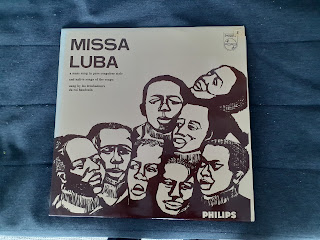We had a record of this in the house when I was growing up. I can't remember what I knew about it - maybe that it was from Africa, but maybe not which country. (I realise now that "from Africa" is not a meaningful description any more than describing pibroch or cerdd dant as "from Europe" would be). We had a lot of folk music in the house, so perhaps I saw it as folk music. And perhaps there is truth in that.
I now have that same record in my house. The front of the record sleeve is shown above.
It is on Spotify, and most of it is in The Planet's Greatest African Music volume 2, dated 2013.
Missa Luba is a setting of the Christian Roman Catholic mass, sung in Latin (the Kyrie is, as usual, in Greek). The sleeve note describes it as "pure Congolese" and "completely void of any modern, western musical influences". The sleeve gives more details of the musical forms used, the kasala, a "Song of Farewell" in Kiluba. A Kasai dance rhythm is used for the Hosanna, and a song of Bena Lulua is used for the Agnus Dei. The note records that none of the Missa Luba is written down, and that "certain rhythms, harmonies and embellishments" are spontaneous improvisations.
Father Guido Haazen, a Belgian Catholic priest recognised "the value to be gained from the retention of this music form", and formed a choir, called Les Troubadours du Roi Baudouin. This choir recorded the Missa Luba in 1958 and toured Belgium, the Netherlands and Germany, possibly, from things seen in Belgian news sites (see below) for the World Exhibition of that year.
The sleeve notes give no detail of the B side, although the front of the sleeve describes them as "native songs of the Congo". There are seven songs, and it says on the record's label, for both sides, "Arr. Pere Guido Haazen".
Now we might want to describe it as songs of the Luba people, rather than just as from the country.
I have not found a lot in the academic literature written about the Missa Luba. Perhaps that reflects the sources I have used. I found these:
Missa Luba, An American Mass Program, and the Transnationalism of Twentieth-Century Black Roman Catholic Liturgical Music, by Kim R. Harris.
Found in Web of Science Core Collection and in Scopus, this looks at the influence of the Missa Luba on Black American Catholics (subscription needed to read the full article).
Missa Luba: a new edition and conductor's analysis, by Marc Ashley Foster.
Found in Google Scholar, a dissertation from the University of North Carolina at Greensboro, from 2005. This includes a biography of Guido Haazen, and interviews with him (he died in 2004), with Dr Ngo Semzara Kabuta, who as a boy was a member of Les Troubadours and Dr Jos Gansemans, an ethnomusicologist from the Central Africa Museum in Tervuren, Belgium, which is now the Africa Museum - a quick search of their website finds nothing about the Missa Luba although their DEKKMMA project is a catalogue of sound recordings and can be searched by country and their Centre de documentation des sciences humaines maintains a database of reviewed articles.
Analysis of the Missa Luba, by Doris Anna McDaniel.
Also found in Google Scholar, an MA thesis from 1973, submitted to the University of Rochester, and available in their repository. It includes the published score, but also a transcription of the percussion, which was not in the original score. This discusses westernisation in the music.
The now closed files of FRANCIS and PASCAL and MLA International Bibliography both found nothing. I know from one of my local universities about RILM Abstracts of Music Literature, but my own university doesn't have that.
Is there anywhere else I could look? I asked colleagues in my own library, who pointed me to African Music Library and the Musicology LibGuide from UNISA: University of South Africa. Couldn't see anything in the former (although it looks very interesting), the latter may need more time! If you have ideas for other places, you are welcome to comment - comments are moderated but I do see them all and I will spot it among the suggestions for health remedies, online sales of medicines, and recommendations for health professionals that I get!
Libraries in the Democratic Republic of the Congo would be worth exploring (a quick look on the site of Unikin, the Universite de Kinshasa, finds nothing).
A general Google search for Haazen or the Missa Luba finds mostly discographies and details of recordings, but also this blogpost from Mark Alburger.
In the 1970s, when I heard this first, it was a fascinating thing. It was music from another country, another continent. Added to that now would be a discussion of the way the mass was written, and the origins of the music, the name of the choir (named after the king of the colonial power, named in French). The way the 1950s sleeve notes present the music is fascinating too. Did Father Guido Haazen collect the melodies and rhythms, and as the labels suggest, arrange it? How "authentic" (my word) is it as an example of the music of that area of the country?
Ralph Vaughan Williams, one of my favourite composers, collected folk music in England, put some of the tunes into churches, and used some of the melodies in his compositions. I think he helped preserve the songs by doing so, as the sleeve notes to Missa Luba suggest Fr. Haazen wanted to do. I think there's a class angle to what RVW did, but there's a different angle to Missa Luba, in that it was a European collecting, wanting to retain the music.
I read somewhere that the recording of the Missa Luba, without the side of songs, has been re-released but as a CD. It would be interesting to compare the sleeve notes.

No comments:
Post a Comment